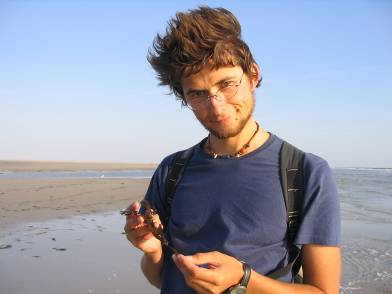| Postdoctoral Researcher Agroecology, Georg-August-University of Göttingen Grisebachstr. 6 D - 37077 Göttingen phone: +49 (0) 551 39 22359 e-mail: jfruend (at) uni-goettingen.de |
 |
 |
| Postdoctoral Researcher Agroecology, Georg-August-University of Göttingen Grisebachstr. 6 D - 37077 Göttingen phone: +49 (0) 551 39 22359 e-mail: jfruend (at) uni-goettingen.de |
 |
 |
Community Ecology, Biodiversity, Ecosystem Functioning, Interspecific Interactions, Global Change Ecology & Conservation
I am interested in the causes and consequences of biodiversity. I want
to understand how communities and ecosystems change under human
influence and what can be done to maintain their functioning in a
changing world. Currently I focus on bees and other pollinators, and
their importance for the pollination of wild plant communities. In the
search for biological mechanisms and processes, I consider it
essential to relate my work to theories of ecological networks,
ecological niches and optimal foraging, as well as to maintain a close
connection to natural history. To understand ecological questions, I
prefer to combine field observations, experiments and modeling.
In my PhD project, I focused on the role of pollinator diversity for the pollination of wild plants and potential mechanisms for pollinator
diversity effects, such as species identity, complementarity and insurance. I studied various aspects relating to this overarching question:
1) I performed an experiment testing the effect of pollinator
diversity on seed production of a community of 14 different plant
species,
using flight cages inhabited by 0 - 5 species of wild bees in
different combinations. This experiment provides the unique opportunity
to analyze replicated pollination networks that vary in pollinator
community composition without confounding variation in other factors
such as abundance or environment.
2) I looked at the impact of global environmental change on pollinator
communities and pollination. I performed a full-factorial field
experiment
simulating advance in flowering phenology, shift in plant height and
habitat loss, to test potential interactions among multiple aspects of
global
change. Investigating the preconditions for an insurance effect of
wild bee diversity against climate change, I studied responses of
different wild
bee species to winter temperatures in a lab experiment.
3) I studied within-day temporal dynamics in plant-pollinator
interactions. Using experiments and network / community analyses, I
focused on the
effect of pollination on the timing of flower closure and its
importance as a driver of temporal patterns in interaction networks.
4) Employing a global perspective on plant-mutualist interactions, I
also compared complementary specialization among tropical and temperate
interaction networks.
In most of my work, I put particular emphasis on separating sampling
artifacts from biological information with the help of null model
simulations.
I also contribute to the R software package bipartite maintained by Carsten F. Dormann (University of Freiburg).
The package is freely available on:
 |  |  |  |
Tscharntke T,
Tylianakis JM, Rand TA, Didham RK, Fahrig L, Batáry P, Bengtsson J,
Clough Y, Crist TO, Dormann CF, Ewers RM, Fründ J, Holt RD, Holzschuh
A, Klein AM, Kleijn D, Kremen C, Landis DA, Laurance WF, Lindenmayer D,
Scherber C, Sodhi N, Steffan-Dewenter I, Thies C, van der Putten WH,
Westphal C (in press). Landscape moderation of biodiversity patterns
and processes - eight hypotheses. Biological Reviews,
in press.
Fründ J, Dormann CF, Tscharntke T
(2011): Linné's floral clock is slow without pollinators - flower
closure and plant-pollinator interaction webs. Ecology
Letters, 14, pp. 896-904.
highlighted in Nature
| Research Highlights: 476, p. 9 (04 August 2011).
Parsche S, Fründ J, Tscharntke T (2011). Experimental environmental
change and mutualistic vs. antagonistic plant flower-visitor
interactions. Perspectives in Plant Ecology, Evolution and
Systematics, 13, pp. 27-35.
Fründ J,
Linsenmair KE, Blüthgen N (2010). Pollinator diversity and
specialization in relation to flower diversity. Oikos,
119, pp. 1581–1590, DOI 10.1111/j.1600-0706.2010.18450.x
Dormann CF, Fründ J, Blüthgen N, Gruber B (2009). Indices, graphs and
null models: analysing bipartite ecological networks. The
Open Ecology Journal, 2, pp. 7-24.
Dormann CF, Fründ J, Gruber B (2008). Introducing the bipartite
package: analysing ecological networks. R News, 8
(2).
Blüthgen N, Fründ J, Vazquez DP, Menzel F
(2008). What do interaction network metrics tell us about
specialization and biological traits? Ecology,
89(12), pp. 3387–3399.
Meyer CFJ, Fründ J, Pineda
Lizano W, Kalko EKV (2008). Ecological correlates of vulnerability to
fragmentation in Neotropical bats. Journal of Applied Ecology,
45, pp. 381–391.
Ferreras-Romero M, Fründ J,
Marquez-Rodriguez J (2005). Sobre la situación actual de Lestes
macrostigma (Eversmann, 1836) (Insecta: Odonata) en el área de Dońana
(Andalucía, sur de Espańa). Boletín de la Asociación
espańola de Entomología, 29 (3-4), pp. 41-50.
Fründ J, Dormann CF, Holzschuh A,
Tscharntke T (2011): Functional complementarity drives the effect of
bee diversity on pollination. Talk at the 12th
European Ecological Federation Congress, Ávila, Spain.
Fründ J, Dormann CF, Tscharntke T (2011): Linné's floral clock is slow
without pollinators - flower closure and plant-pollinator interaction
webs. Poster at the Conference 'Functions and
Services of Biodiversity', Göttingen, Germany.
Schleuning M, Fründ J, Klein A-M, Dormann CF, Blüthgen N, Abrahamczyk
S, Alarcón R, Albrecht M, Andersson G, Bazarian S, Böhning-Gaese K,
Bommarco R, Dalsgaard B, Dehling M, Gotlieb A, Hagen M, Hickler T,
Holzschuh A, Kaiser-Bunbury C, Morris RJ, Sandel B, Sutherland W,
Svenning J-C, Templin M, Tscharntke T, Watts S, Weiner C, Werner M,
Williams NM, Winqvist C (2011): Complementary specialization of
mutualistic interaction networks decreases towards tropical latitudes. Talk
at the 24th annual meeting of the gtö (Society for Tropical Ecology),
Frankfurt, Germany
Fründ J, Dormann CF, Holzschuh A,
Tscharntke T (2010). Pollinator diversity and the pollination of wild
plants in an experimental setting. Talk at the
95th annual meeting of the Ecological Society of America, Pittsburgh.
Fründ J (2010). Rapid flower closure as a response to
pollination. Talk at the Multitrophic
Interactions Workshop, Göttingen.
Fründ J,
Blüthgen N (2009). Flower preferences of generalist bees and hoverflies
compared between interaction webs. Talk at the
annual meeting of the DGaaE (German Society for General and Applied
Entomology), Göttingen, Germany.
Parsche S, Fründ
J, Tscharntke T (2008). Does environmental change reduce pollination
success by wild bees? Poster at the 38th annual
meeting of the GfÖ (Ecological Society of Germany, Switzerland and
Austria), Leipzig, Germany.
Dormann CF, Fründ J,
Blüthgen N, Gruber B (2008). Indices, graphs and null models: tools for
elucidating the ecological causes of bipartite network topology.
Talk at the 38th annual meeting of the GfÖ, Leipzig.
Dormann CF, Fründ J, Blüthgen N, Gruber B (2008). Indices,
graphs and null models: tools for elucidating the ecological causes of
bipartite network topology. Talk at the annual
meeting of the BES, London.
Fründ J, Linsenmair
KE, Blüthgen N (2007). Does pollinator diversity and specialization
increase with flower diversity? Talk at the 37th
annual meeting of the GfÖ, Marburg, Germany.
Fründ J, Meyer CFJ, Kalko EKV (2006). Species sensitivity to
fragmentation: bats on land-bridge islands in Gatun Lake, Panama.
Poster at the 19th annual meeting of the gtö (Society for
Tropical Ecology), Kaiserslautern, Germany.
Fründ J, Beckedorf S (2011). Ohne Bienen geht die Uhr nach. Deutsches
Bienen-Journal, 36, p. 468.
Fründ J
(2011). Invited Talk, University of Würzburg.
Fründ J (2011). Invited Talk, Leuphana University of Lüneburg.
Articles reviewed for:
| 2011-present: | Postdoc, University of Göttingen |
| 2010: | Lab visit in the group of Neal M. Williams, UC California, Davis, CA, USA. |
| 2007-2011: | PhD-Student, University of Göttingen, supervised by T Tscharntke and CF Dormann (topic: importance of pollinator diversity for pollination of wild plants), graduate program "Biodiversity and Ecology", fellowship from German Federal Environmental Foundation |
| 2006-2007: | Diploma thesis, supervised by N Blüthgen and KE Linsenmair (topic: influence of flower diversity on pollinator diversity and specialization) |
| 2005: | Internship / research at Smithsonian Tropical Research Institute, Panama (topic: bats and habitat fragmentation) |
| 2005: | Student at Universidad Pablo de Olavide, Sevilla, Spain (project on Odonata of Dońana) |
| 2002: | Field trip to Comoé NP, Côte d’Ivoire (project on driver ants) |
| 2001-2007: | Student of biology, University of Würzburg: major in "Animal Ecology and Tropical Biology" minors in "Plant Ecophysiology and Vegetation Ecology" and "Behavioural Physiology and Sociobiology" |
| 2000-2001: | Civilian Service in an environmental education center (Lernstandort Noller Schlucht, Dissen) |
| 1999: | Contest "Jugend forscht": awarded with "special price environment" (topic: ecological value of garden ponds, emphasis on Odonata) |